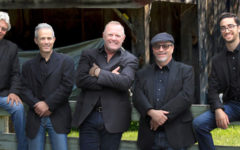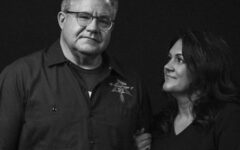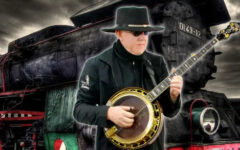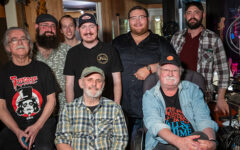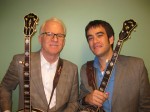 I had a chance last week to speak with Punch Brothers banjo maestro Noam Pikelny about his new solo project, Beat The Devil and Carry A Rail, due from Compass October 25. He was very frank in discussing the album, his compositions and his evolving approach to the five string.
I had a chance last week to speak with Punch Brothers banjo maestro Noam Pikelny about his new solo project, Beat The Devil and Carry A Rail, due from Compass October 25. He was very frank in discussing the album, his compositions and his evolving approach to the five string.
We’ll include his thoughts on all that as the released date draws near, but wanted to share some other information that came up in our conversation, unrelated to the CD.
Noam mentioned that Punch Brothers will be heading into the studio in October to start work on their next record. The material is already written/chosen, and as per their habit, they plan to track more material than they will use on the CD, and select the strongest pieces for inclusion.
On the vibe of the music…
“This one is continuing in the direction of the last record [Antifogmatic], in that it’s more song-oriented, more collaborative in the writing and arranging.
There will be some covers on there: Another World from Josh Ritter and a couple of traditional tunes like Moonshiner. We’ll record them at least.”
I also asked Noam for his thoughts about seeing the second annual Steve Martin for Excellence in Banjo and Bluegrass Music having been recently awarded to Sammy Shelor, and about the impact of having receiving the award himself in 2010.
“My personal reaction was absolute thrill and delight. I’m a huge fan, and Sammy was a major influence on me when I was falling in love with the banjo. Back in Junior High there were two guys who really caught my attention: Sammy and Béla Fleck. I got see Lonesome River Band at Frontier Ranch and I loved Sammy’s sound, and the tone he got from his top tension really made a lasting impact. That surely planted the seed for my own love for top tension banjos.
Sammy is great and I’m really psyched to see that the members of the board are looking in all directions for great players of the banjos. It is a beautiful thing.
I was extremely proud when I got the award last year, but there was a bit of guilt associated with it as well. I was fairly new on the scene, fortunate enough to work in a successful band, but there so many other great players worthy of the recognition – like Sammy. It warms my heart that he got it this year.
The award brought me all kinds of different publicity at first, partly because it was the first year. The Letterman performance was the height of the extra attention brought upon me and the band. It’s shocking how many people have seen it. At least every 2nd/3rd Punch Brothers show someone comes up to the table and says that they had never heard of us until we were on the show.
It’s one thing for someone to see something on late night TV and go buy a track or order an album, and another to go to the trouble to come out. It is really sweet to meet these people at the shows.”
That brought to mind a question that can only be answered by a technical master of the instrument: is it a weird thing to carry the mantle of progressive banjo hero, in much the way Fleck did with New Grass Revival?
“I’m proud to be playing in a band that is reaching a large audience. It doesn’t really feel weird to be in this position; it’s what I’ve always been working towards.
I’ve always had a love for bluegrass banjo, and an interest in using it in other musical forms. Punch Brothers is a perfect fit for me and my music. They will challenge me to find a place for the banjo in a non-idiomatic setting. But we do play bluegrass in our shows, and we get to play our version of straight bluegrass. That is happening more and more these days.
We do these residency shows in New York which we call P-Bingo shows. Each one would be all new, or almost all new material. We use the shows to work on new material, and try out bluegrass songs or bluegrass versions of covers – like the Beatles’ Paperback Writer.
The bluegrass roots are still what everyone in the band has in common. We all have an immense love for the style.
There are times when I do feel like I might get exalted by a new fan, when so much credit goes to all the players that went before. I’m still trying to get a better grasp of the instrument, and to play the instrument with more fluidity. I owe so much credit to them, but am right now mostly inspired by listening to great pedal steel and fiddle players. There is such a lyricism that flows in the music of a great fiddle player.
At times the lack of sustain with the banjo is frustrating, but in recent years I try to set up my banjo for as warm a tone as possible, and the ability to get more sustain without compromising the tonal characteristics.”
More soon from this modern day banjo innovator.

